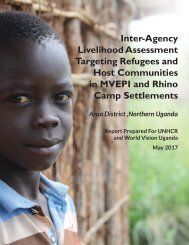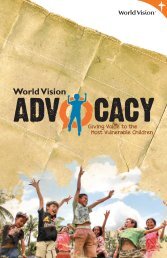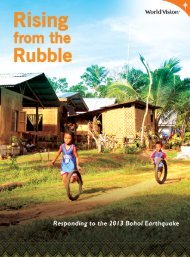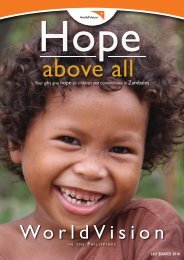SAENER18 Months On Report FINAL (NON-HiRES)
You also want an ePaper? Increase the reach of your titles
YUMPU automatically turns print PDFs into web optimized ePapers that Google loves.
Ensuring Humanitarian Accountability<br />
The National Offices of Angola, Lesotho, Malawi, Mozambique, South Africa, Swaziland,<br />
Zambia and Zimbabwe implemented humanitarian accountability mechanisms that<br />
are critical to the effectiveness of the provision of humanitarian aid in whatever form, and<br />
improved the response’s programme quality. The approaches were guided by the WVI<br />
Programme Accountability Framework: information provision, community consultation,<br />
participation and the collection of feedback and complaints.<br />
99<br />
Involving the beneficiaries in assessment as input to designing of projects<br />
99<br />
Capacity building of local project management committees<br />
99<br />
Information provision about the response’s objectives and processes<br />
99<br />
Participation of key stakeholders in structured consultations at predetermined<br />
stages of project implementation<br />
99<br />
Community Help Desk (CHD) to receive and address complaints.<br />
Community Help Desks (CHD) were set up to coordinate community<br />
feedback on the implementation of the project. World Vision established<br />
procedures of complaint resolution which are efficient and safe for<br />
beneficiaries, communities affected by disasters, agency staff, and<br />
humanitarian staff and for other specified bodies. The project staff<br />
regularly consolidates the list of complaints received and explain how<br />
they were to be dealt with. This helped World Vision to solve issues early<br />
and therefore run a more effective response.<br />
26<br />
The response employed SPHERE Standards<br />
as a guide to ensure high level community<br />
participation. Community based and<br />
people-centered aid delivery approach were<br />
used ensuring community participation at<br />
all levels of the project cycle. Participation<br />
of communities in the project increased<br />
transparency, accountability and instilling<br />
ownership and sustainability of the project.<br />
Community involvement was promoted<br />
at all stages which included beneficiary<br />
identification, targeting and registration,<br />
verification of eligible beneficiaries,<br />
distribution of food and cash/voucher<br />
monitoring of project activities. Various<br />
committees from the communities such<br />
as WASH committees, food distribution<br />
committees, among others, were put in place<br />
to strengthen community knowledge on<br />
humanitarian accountability partnership.<br />
The social accountability tool Citizen Voice<br />
and Action (CVA) was also integrated in<br />
Community health mobilizer, Teresa Joana Ndunguvyougo, assists<br />
the response. CVA is used to advocate for mothers in Humpata Municipality, Angola in monitoring cases of<br />
local municipalities to establish Disaster malnourishment of children in the area<br />
Advisory Complaints and Response<br />
Mechanisms in some areas.<br />
18 MONTHS ON REPORT Southern Africa El Niño Emergency Response (SAENER)










